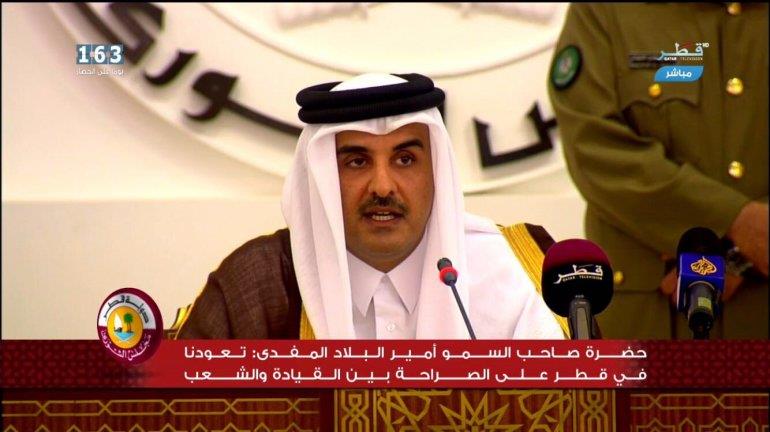
Blockade countries' plan to hurt Qatar's economy failed: Emir
The negative impacts of the unjust blockade by the four Arab states on Qatar were temporary and the economy managed to contain these impacts and come out of it very quickly, the Emir H H Sheikh Tamim bin Hamad Al-Thani said while attending the opening of the 46th ordinary session of the Advisory Council on Tuesday morning at the Council's premises.
The Emir said that work is underway to implement economic development projects that would help in fortifying Qatar's economy, these include establishing areas for storage, developing logistics and introducing a number of food security projects.
'The measures taken by the blockading countries were aimed at creating a political shock, affecting Qatar's stability and forcing us to accept tutelage and cede our independence. Then they have moved on to a second plan that is still being applied. It could be summed up as an attempt to harm our economy. But they have erred in their evaluation of the will of the Qatari people and the State, as well as in their estimates of our economy, the Emir said.
'The negative impacts of the blockade were temporary and our economy has managed to contain most of them very quickly, while adapting and developing itself in the course of the crisis management, he added.
'These campaigns have not affected our major exports of oil and gas. On the contrary, our respect for our gas export contracts - even to countries that have played a leading role in the campaign against our country - has boosted the confidence of the international community in our credibility to honor our commitments, in addition to our keenness not to harm a brotherly people.
'In continuation of efforts to support small and medium industries, an industrial zone has been developed with state-of the-art basic services and facilities, in addition to the construction of industrial facilities which are ready for the private sector.
'As a result of Qatar's strong economy and its ability to withstand the crises rapidly and efficiently, the monetary authorities, in collaboration with the fiscal authorities, the banking and financial systems, were able to counter and foil attempts to harm the Qatari Riyal, thus maintaining the financial and exchange rate stability and free remittances.
'Before the present crisis we were preoccupied with curbing the impacts of falling oil prices on our development plans, as oil and gas prices fell by 49% in 2015, and a further fall of 18% in 2016.
'As expected, this cumulative decline, has led to low growth rates in all GCC countries, including Qatar, where GDP growth in fixed prices fell from 3.6% in 2015 to 2.2% in 2016.
'Despite this decline, per capita income in Qatar, according to purchasing power is still among the highest in the world, according to international institutions' reports such as the World Bank, and the International Monetary Fund. However, this shouldn't lead us to self-conceit, as this achievement was not easily achieved, and maintaining it requires redoubling the effort. It is not to be taken for granted.
'It is reassuring that although the hydrocarbon share in GDP has fallen by about 1%, Qatar's growth rate has improved, as the share in GDP from other sources has risen by about 5.6%.
'Our achievement of this rate does not mean that we are satisfied with it, as it is less than our ambitions, and we will strive to achieve higher growth rates in the future. Our commitment to implement prepared plans in the fields of industry, agriculture, trade, tourism and services, will contribute to that end."

Legal Disclaimer:
MENAFN provides the
information “as is” without warranty of any kind. We do not accept
any responsibility or liability for the accuracy, content, images,
videos, licenses, completeness, legality, or reliability of the information
contained in this article. If you have any complaints or copyright
issues related to this article, kindly contact the provider above.


















Comments
No comment